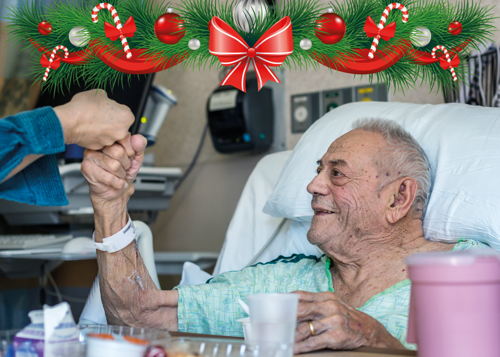
Winter weather has been reported to trigger cold sores, usually caused by the Herpes simplex 1 virus, and host behaviour needs to be adjusted at Christmas in order to prevent transmission to unsuspecting family and friends.
Are cold sores a problem in healthcare settings?
Immunocompromised patients may be particularly susceptible to infection and subsequent risk of dissemination. As the virus can be transmitted between patients and personnel, remember that prevention is better than cure. Observe hand hygiene best practice, avoid puckering up at work, and stick to wishing Merry Christmas with a fist-bump.

Do make sure you remind the family chef not to rinse the family turkey as a prep step on Christmas day. It is almost impossible to wash bacteria off a turkey, and juices from the bird that splash during washing can transfer bacteria onto the surfaces of the kitchen, other foods and utensils. Food poisoning, which can be caused by Salmonella, Campylobacter, E. coli and Listeria to name but a few, can be a real risk at Christmas. Good hand and surface hygiene whilst preparing food is a must. The importance of thawing, cooking and storing turkey correctly should not be underestimated.
Is food poisoning a problem in healthcare settings?
Unfortunately, yes. During 2019 PHE reported the deaths of six hospital patients linked to an outbreak of listeria in pre-packed sandwiches and salads. Whilst uncommon, Listeriosis can be extremely serious for vulnerable patient groups. And it’s not just patients who are at risk – one report from 1986 described 82 cases of salmonella food poisoning arising from contaminated tartare sauce served in the hospital canteen.
Alcohol hand gels are now prominently displayed in every healthcare setting, and whilst they can reduce the spread of infection between personnel, patients and visitors, they aren’t effective on Norovirus and C. difficile, both of which will dampen your Christmas spirit, should they decide to pay you a visit.
Are alcohol hand rubs a problem is healthcare settings?
Aside from causing dermatitis in some people, alcohol hand gels are generally trouble-free in normal use. However there are accounts of “alternative” uses, with a number of reports of patients and visitors drinking alcohol hand gel. The high alcohol content has made them attractive for illicit use, and in 2015 the BBC reported that a gang systematically targeted London hospitals to steal alcohol hand gel. However, it also poses a hazard to confused patients and, when consumed from large-volume dispensers, hand gel can be fatal.
Finally, as you contemplate hanging up your Christmas stocking, remember that non-slip socks can be a vector for transmitting multi-drug resistant organisms in hospitals. Hospital floors are known to be a source of potential pathogens, and Mahida and Boswell (2016) reported the detection of vancomycin-resistant enterococci and meticillin-resistant Staphylococcus aureus from socks collected from patients.
Merry Christmas!